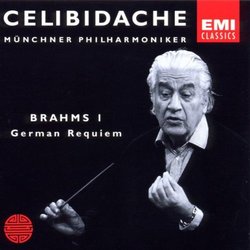| All Artists: Johannes Brahms, Sergiu Celibidache, Münchner Philharmoniker, Arleen Auger, Franz Gerihsen, Philharmonischer Chor München Title: CELIBIDACHE / Münchner Philharmoniker - Brahms: Symphony No. 1 / Ein deutsches Requiem Members Wishing: 1 Total Copies: 0 Label: EMI Classics Release Date: 8/10/1999 Album Type: Import Genre: Classical Styles: Opera & Classical Vocal, Historical Periods, Early Music, Symphonies Number of Discs: 2 SwapaCD Credits: 2 UPC: 724355684325 |
Search - Johannes Brahms, Sergiu Celibidache, Münchner Philharmoniker :: CELIBIDACHE / Münchner Philharmoniker - Brahms: Symphony No. 1 / Ein deutsches Requiem
 | Johannes Brahms, Sergiu Celibidache, Münchner Philharmoniker CELIBIDACHE / Münchner Philharmoniker - Brahms: Symphony No. 1 / Ein deutsches Requiem Genre: Classical
|
Larger Image |
CD Details |
CD ReviewsPowerful. Beautiful. Jeffrey Gray | Georgia | 03/08/2006 (5 out of 5 stars) "This recording was my first introduction to Celibidache's conducting and I must say I've been very impressed. The phrasing, dynamics, and tonal richness are superb. The tempo is decidedly slower than most performances of this requiem (hence the need for two CDs), but that can be traced to the fact that it is a live recording and Celibidache was very sensitive to the dynamics of each concert hall he was performing in. If there was more reverb in the hall, tempos were slower because each note had to be given full space to breathe... to live and develop. I really appreciate the slower tempo, though, because I've heard so many more things in Celibidache's recording than in the other 5 I own (Herreweghe [the best of the remaining five], Previn, Shaw, Gardiner, and Blomstedt). I would highly recommend this recording if you're looking for an extremely sensitive, passionate performance (and don't mind the occasional audience cough). If you want a crystal clear, measured, polished, studio recording, I would go with Herreweghe's recording." Tempo y sensibilidad increibles... J. Versalles | Gijón - España | 09/07/2004 (5 out of 5 stars) "Parece que ahora se impone recuperar una cierta vivacidad en el Requiem de Brahms, siguiendo sin duda la tendencia de los directores "historicistas", y más en concreto la estupenda versión de Gardiner. De acuerdo, la ecuación que iguala lentitud a espiritualidad nos suena a caduca sensibilidad decimonónica, a melífuas plañideras y beatería. Pero al escuchar esta versión de Celibidache, con una duración muy superior a la del inglés, no puedo por menos que olvidarme de las normas y modas sobre tempos: la morosidad de Celi no es blanda ni cansina, sino un prodigio de intensidad y de control, una maravilla que en manos de cualquier otro de desharía como un buñuelo de viento recalentado y fofo, pero que gracias a esa firmeza e intensidad deja a la postre la sensación de máxima unidad y penetración: un autentico placer de desarrollo, que deja una huella imborrable. Corre uno el peligro de no poder tomarse en serio el resto de las versiones, que al lado de esta parecen ejercicios de escolares con prisas por acabar sus exémenes. La orquesta y el coro suenan magníficos, bajo el portentoso control del director. Los solistas son estupendos, muy en especial el (para mí) desconocido Franz Gerihsen. Toda esta intensidad en la duración, esa potencia no basada en la sofisticación y en una ternura razonable hacen de este "Requiem humano" una joya que le deja a uno con el ánimo en forma para todo el día... " Hushed religious awe or a long winter's nap? Santa Fe Listener | Santa Fe, NM USA | 01/22/2008 (3 out of 5 stars) "I remain fascinated by the consistent rapture of the reviews that Celibidache receives at Amazon. In this case, the shower of five stars goes to the slowest reading of the German Requiem that's consistent with musical coherence. At times the l-o-n-g buildup of tension works, as in the 15-min. second movement -- and there's no denying that the Munich choir along with the baritone and soprano soloists cope beautifully, or that the live concert recording is in fine sound.
But what strikes others as hushed religious awe affects me differently. The drawn-out pacing never varies. I can't understand why Celibidache wants to deny Brahms his outbursts of energy and fervor, preferring instead a hypntoic, unvarying spiritual reverence. Having said that, this reading certainly displays exactly what his musical philosophy is. The Sym. #1 is similarly extended in the first and last movements, although not as egregiously. I was impressed by Celibidache's balances; the voicing of the orchestra is always beautiful. But as in the Requiem, he favors legato phrasing that erases Brahms's strong accents and dramatic contrasts. Clearly there are listeners who fall under the spell, but for me it's a matter of "you had to have been there." A hypnotic live experience feels anesthetized on records. " |

 Track Listings (6) - Disc #1
Track Listings (6) - Disc #1